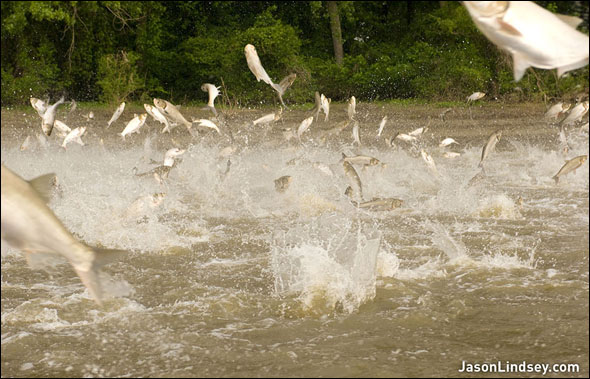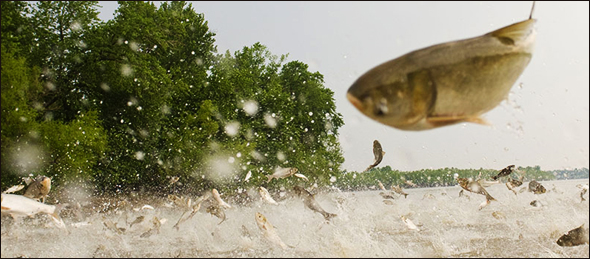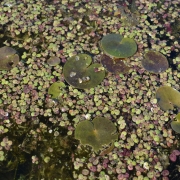Supreme Court Rejects Michigan’s Asian Carp Lawsuit
Michigan’s Attorney General Mike Cox is “looking at other legal avenues” to pursue the carp battle.

By Steve Kellman
Circle of Blue
Michigan’s effort to bring the Asian carp fight to the U.S. Supreme Court came to an abrupt end Monday with a terse two-sentence denial from the court.
The ruling effectively ends Michigan Attorney General Mike Cox’s four-month effort to convince the nation’s highest court to wade into the legal debate over the invasive species threatening Lake Michigan. Cox sought to reopen a decades-old lawsuit against Chicago’s diversion of Lake Michigan water to force the closure of Chicago-area locks that threaten to let the carp into the freshwater body.
“The fight to protect Michigan’s jobs and environment now falls to President Obama and Congress,” Cox said in a statement. “While President Obama has turned a blind eye to the millions of Great Lakes residents who do not happen to live in his home state of Illinois, it is now up to him to save thousands of Michigan jobs and our environment.”
Asian carp have been making their way up the Mississippi and Illinois rivers for decades since being imported to clean catfish ponds in southern parts of the country, while government workers also attempted to use the fish for weed control sewage disposal. Established populations now live just a few miles from Lake Michigan, in the Illinois River and the canals that transport Chicago’s municipal waste away from the city.
“While President Obama has turned a blind eye to the millions of Great Lakes residents who do not happen to live in his home state of Illinois, it is now up to him to save thousands of Michigan jobs and our environment.”
-Mike Cox
Michigan Attorney General
Midwest officials and environmentalists fear that the invasive fish could devastate the Great Lakes ecosystem and destroy the region’s $7 billion sport fishing industry if a breeding population becomes established in the lakes. DNA tests suggest that at least some fish have already made their way past the electric fish barriers.
But the high court dismissal does not end the attorney general’s legal options, according to spokesperson Joy Yearout.
“We are looking at other legal avenues including action in federal district court, but we’re reviewing those options right now,” Yearout told Circle of Blue. “Even while that legal review is happening, the attorney general is still committed to doing what he can to raise public awareness and put pressure on Washington to take action.”
“Both the president and Congress could take action to solve this problem; it doesn’t need to be a legal solution,” Yearout added.
Nick Schroeck, executive director of the Great Lakes Environmental Law Center, said the attorney general has several legal options, including suing the state of Illinois and the federal government in federal court. He could also a file suit in state court in Illinois against the Metropolitan Water Reclamation District of Greater Chicago, which oversees the network of locks and canals that threaten to let the carp into Lake Michigan.
Environmental groups could take up legal action in state court as well, Schroeck said, “perhaps using the Illinois Endangered Species act.”
“Other states could sue too,” Schroeck noted. “The other interesting case is that Canada may now choose to get involved.”
The Great Lakes Environmental Law Center, an independent, not-for-profit group of environmental attorneys working to protect the lakes, supported Cox’s efforts.
Since the case was reopened in December, the Michigan case generated more than two dozen motions, responses, memoranda, appendices and friend of the court briefs. The states of Indiana, Minnesota, New York, Ohio and Washington all weighed in with motions in support of Michigan’s efforts, as did the Queen in Right of Ontario. Ontario is the only Canadian province to border the Great Lakes, and Ontario officials fear that Asian carp could devastate the province’s fishing industry.
Illinois state officials oppose the closure attempts on economic grounds, noting that the locks and canals are used for flood control and to transport some 7 million tons of cargo a year. The U.S. Solicitor General, Elena Kagan, sided with Illinois and noted that the federal government is already taking several steps to block Asian carp from getting past the locks and into the lake.
“In a host of ways, the federal government has demonstrated its commitment to protecting the Great Lakes from the expansion of Asian carp,” Kagan wrote in her memorandum in opposition to Michigan’s request. “Nothing in federal law warrants second-guessing its expert judgment that the best information available today does not yet justify the dramatic steps Michigan demands.”
Kagan’s argument—and the fact that the U.S. government took sides in the dispute—might have helped doom Michigan’s motion to reopen the Illinois lawsuit.
“The federal government weighing in on Illinois side was a very big hurdle to overcome,” Schroeck said.
“On the other hand, the federal government’s got ownership of the issue now,” he said. “If the carp get in and there’s a reproducing population of Asian carp in Lake Michigan, the feds are going to have to answer for that.”
Cox is just one of several Michigan politicians seeking to block the carp from getting into Lake Michigan. U.S. Rep. Dave Camp (R-Mich) has sponsored a bill called the CARP ACT (Close All Routes and Prevent Asian Carp Today) that would close the locks, erect barriers in channels and rivers keep carp out of Lake Michigan during floods, and reinforce the current carp blocking and monitoring efforts. He introduced the bill following the Supreme Court’s first rejection of Cox’s preliminary injunction request.
The bill has won nine co-sponsors: from Michigan, Minnesota and Ohio, and is now before the House Committee on Transportation and Infrastructure.
U.S. Senator Debbie Stabenow (D-Mich) introduced a version of Camp’s CARP ACT in the Senate, where it has garnered six co-sponsors and been referred to the Committee on Environment and Public Works.
On Friday, the day before the opening day of fishing season in Michigan, Camp sent out an e-newsletter to his supporters seeking signatures on a petition supporting his bill.
Cox, who is running on the Republican ticket for governor, praised current Democratic Governor Jennifer Granholm and the state’s Department of Natural Resources & Environment for their efforts to block Asian carp in his statement on Monday. He also called on Congress to pass the CARP ACT while urging concerned citizens to call the White House, sign the online petition he posted on his StopAsianCarp.com website, and post comments on the campaign’s Facebook page.
Cox spoke with Circle of Blue during a public rally in Traverse City in February, noting that 80,000 people had signed the petition at stopasiancarp.com.
Steve Kellman is a Circle of Blue writer and reporter. Reach him at circleofblue.org/contact.








We must take action Now . If not the The Asian Carp Crisis Will Explode into Lake Michigan , and then to the rest of the Great Lakes.
I have recently published the Asian Carp Resolution That will stop the further threats to the ecosystems of the Great Lakes.
Please follow and help with you comments!
The first rule of Nature is the survival and life prefers to do that under the most favorable conditions, so do Asian carp. What people should is why the Asian carp likes our water and that is simple, as it provides plenty of food, the direct result of the plentiful presence of algae and other aquatic plant. All the result of the fertilizers, originating among others from the untreated sewage dumped into open waters. Nitrogenous (urine and protein) waste in sewage is not requires to be treated due to the fact the EPA, by using an essential pollution test incorrectly, ignored this waste, which basically contains all the fertilizer used to grow the food the people eat. (www.petermaier.net)
Without correcting this mistake and properly treat sewage, we probably have to learn to eat the Asian carp.